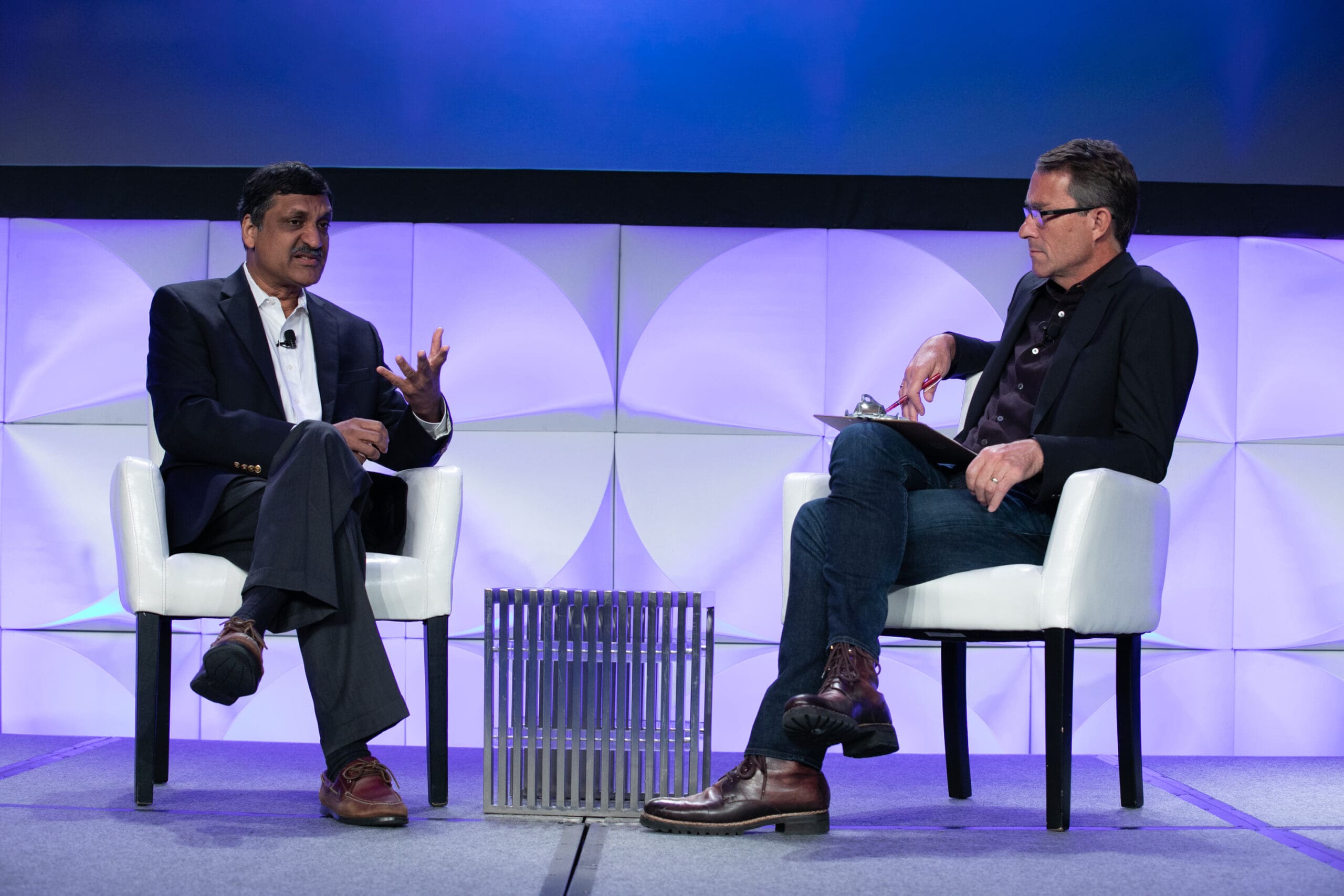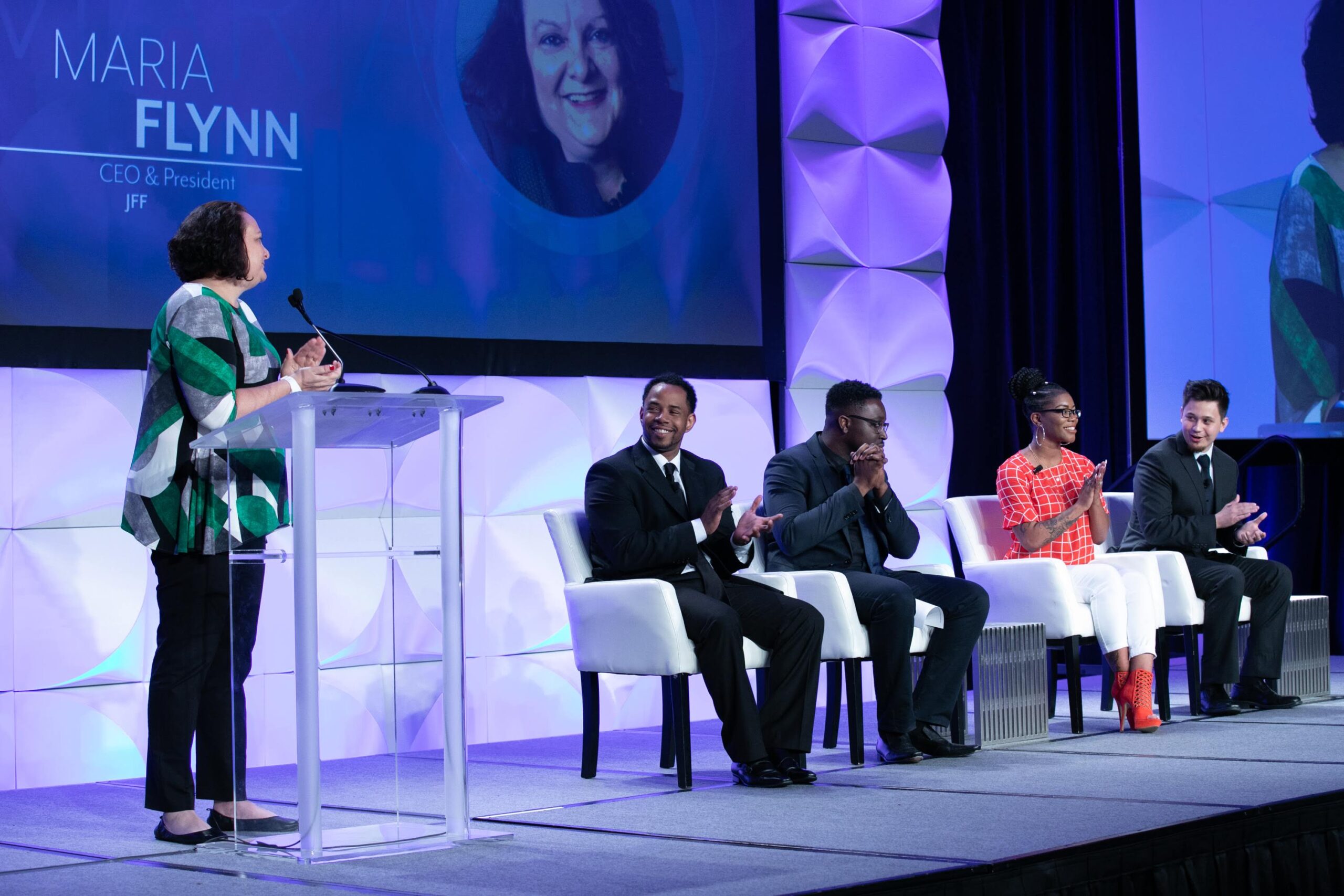
Horizons 2018
Horizons convenes national leaders to transform America's education and talent development systems. See below for details on Horizons in 2020!

June 19, 2018
Despite all the hype and handwringing, not nearly enough is being done to prepare the American public for the future of work. But there were plenty of ideas and examples of innovation to create a more equitable future for all at JFF’s national summit, Horizons.
John Battelle, cofounder and CEO of NewCo, in an opening plenary, acknowledged that technology is often blamed for current and future job displacement. But he added: “Tech also can be a very strong driver of our response.”
Anant Agarwal, CEO of the global education platform edX, agreed but noted that so far society is not taking the issue seriously. “There’s an incredible urgency,” Agarwal said, adding that half of today’s jobs are expected to be gone by 2030. “We’re 12 years out. This is the biggest issue we face today, and we’re doing nothing about it”—not at any meaningful scale.
Figuring out what to do—and how to do it—was precisely the goal of the 800 Horizons attendees, who represented traditional education and workforce systems joining with new economy players in industry, technology, and philanthropy.
Culled from more than 60 sessions at Horizons, here are five actions we all can take, starting right now.

People will be moving in and out of jobs for the rest of their lives, they need skills for surviving in an unstable environment.
Tod Loofbourrow, CEO of ViralGains
With job roles and responsibilities changing all the time, workers will need to continually gain new skills to get and stay employed. Traditional education credentials, which can take several years and hundreds of thousands of dollars to earn, may well be outdated by the time they are handed to the student.
The accelerating pace of technological change will be tough on those who will be displaced, yet it also has the potential to revolutionize the workforce by finally leveling the playing field. Demand for skills over credentials may well create greater opportunities for those who can’t afford postsecondary education or whose life circumstances make it impossible to stay in school while working and raising families.
In some cases, technology is stepping in to accelerate the process. For example, Skillist is subverting the traditional resume. The Boston-based startup works with employers to convert traditional job descriptions into skill summaries and works with applicants to demonstrate the in-demand skills they have.
In addition to occupation-specific technical skills and broad employability skills like communication and collaboration, new types of skills will be essential for the fast-changing future, such as resilience and self-advocacy, said Tod Loofbourrow, a JFF board member and CEO of ViralGains.
“People will be moving in and out of jobs for the rest of their lives,” he said. “They need skills for surviving in an unstable environment.”
There needs to be a simple way for employers to engage the system, to be able to inform what the right skills are today and in the future as they continue to evolve.
Steve Johnson, Amazon
In an economy where there are more jobs than jobless individuals—6 million jobs compared to 4.5 million people looking for work in the US—companies must be more innovative and inclusive in their talent development and hiring.
“It’s an employer problem to take the lead on,” Steve Johnson of Amazon said. “There needs to be a simple way for employers to engage the system to be able to inform what the right skills are today and in the future as they continue to evolve.” The most successful models in the oft-mentioned European countries are employer driven, he noted.
Employers also need to invest far more in their workers’ training, through work-based learning, tuition subsidies, and other methods. Amazon and McDonald’s detailed how they are helping their employees learn new skills by providing prepaid tuition, regardless of whether they stay at the company or seek opportunities elsewhere. Even though employees could acquire skills that enable them to leave for another job, this benefit is attracting high numbers of talented applicants to those employers.
Speakers and attendees alike repeatedly called for employers to expand the diversity of their talent pool by embracing new recruiting strategies. With research studies showing preference for men with Caucasian-sounding names like John over men named Jamal, even with identical resumes, companies like Blendoor remove names and other identifying characteristics from resumes to remove unconscious bias in hiring.
Enlearn Chief Scientist Zoran Popovic challenged colleges and universities to change their rigid curricula and customize the learning experience for students. Agarwal echoed that education must become modular in the future. Smaller modules enable learning to take place over shorter periods of time for less money.
Popovic encouraged taking advantage of technologies that provide speed, flexibility, and convenience for students who don’t have time to commit to a four-year, semester-based system. Agarwal confirmed that future education will be omnichannel—delivered via a combination of in-person and online experiences over many media.
A final essential feature of education that Agarwal stressed is that education must become lifelong. If education is no longer thought of as primarily for 18-year-olds, the shift to continuous education (that is modular and omnichannel) throughout each worker’s life will be invaluable as they change jobs or even careers and need to learn new skills in order to adapt.
Where you’re born matters more to economic mobility than whether you earn a college degree. So much so, in fact, that low-income individuals with a bachelor’s degree earn significantly less than higher-income people with just a high school diploma.
How can this be? JFF Senior Advisor Nancy Hoffman believes the answer may be social capital—cultivated relationships with people who have connections to employers and are willing to mobilize on your behalf. For decades, such networks based on family connections have helped affluent young people secure the jobs they seek, while lower-income individuals often have nowhere to turn.
This issue is complicated and doesn’t offer any easy solutions, but it must be on people’s radar. Mentoring programs and work-based learning opportunities are two good places to start.
I don’t know who all these superhumans are who are going to be working, learning, and upskilling. Taking care of their aging family members and their children is going to become their side hustle.
Ashley Beckner, Omidyar Network
While the future of work and learning is on everybody’s lips, there’s a new phrase that many at Horizons hope will catch on just as quickly: the future of care.
“I don’t know who all these superhumans are who are going to be working, learning, and upskilling,” said Ashley Beckner of the philanthropic investment firm Omidyar Network, created by eBay Cofounder Pierre Omidyar. “Taking care of their aging family members and their children is going to become their side hustle.”
While Las Vegas is known for 24/7 child care centers because so many people work overnight shifts in the casino industry, similar innovations are needed to care for children of late- or early-shift workers around the country. Without government, philanthropic, and employer support to make it possible for families to care for children, aging family members, and individuals with disabilities, Americans will not be able to focus on the work our economy needs us to do.

The summit closed with the inspiring stories of four young people who had overcome life challenges to pursue education and find rewarding careers. They reminded us of why our work matters and will matter even more in the face of accelerating economic change.
We need to ensure that we’re not creating a system that only creates opportunities for some people. We need to ensure it’s for everybody.
Adam Strong
Adam Strong, who was raised in poverty by a single father in Appalachia and is now pursuing a master’s degree in public policy, urged attendees to find solutions that keep equity at the center. “We need to ensure that we’re not creating a system that only creates opportunities for some people,” he said. “We need to ensure it’s for everybody.”
Maria Flynn, JFF’s president and CEO, sent attendees off with a wish to move this work forward: “I hope our time together will inspire you and drive you to deeper action and deeper impact.”

Horizons convenes national leaders to transform America's education and talent development systems. See below for details on Horizons in 2020!

Day 1 Speakers - Click Button Below Day 2 Speakers - Click Button Below Horizons Attendees - Click Button Below